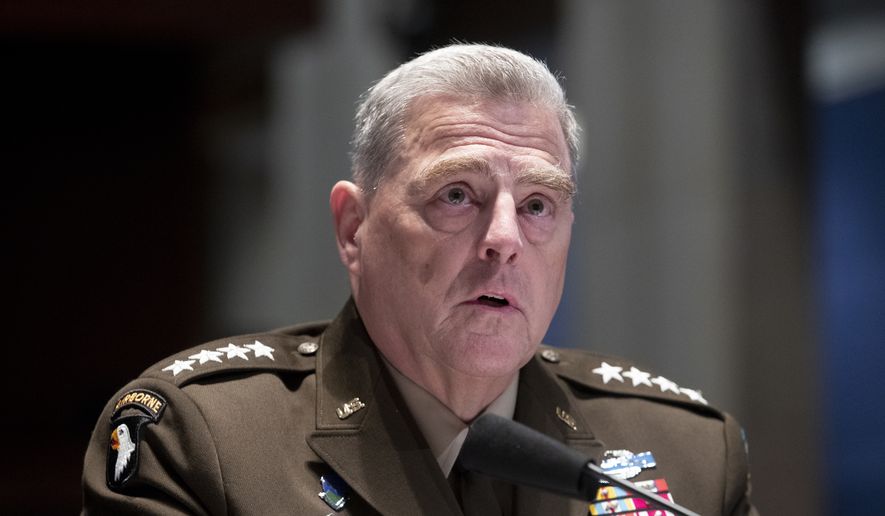The Confederacy and its leaders were guilty of “treason” against the United States and honoring them in today’s military can be deeply troubling to minority service members, America’s top general said Thursday in blunt comments that highlight the Pentagon’s growing rift with President Trump.
In testimony to the House Armed Services Committee, Joint Chiefs of Staff Chairman Gen. Mark A Milley said it is vital that the military undertake a thorough review of its ties with the Confederacy, which include at least 10 Army installations named after Confederate generals. Military officials, lawmakers and a host of other stakeholders have expressed strong support for nixing those names, but the president opposes the change.
Gen. Milley seemed to show support for renaming the bases and more generally for ending any and all military practices that portray the Confederacy in a positive light. Glorification of the Confederate cause, he said, is problematic for a military that’s increasingly made up of Black service members.
“In the Army for example … We’re up to 20-plus% African-American and in some units you’ll see 30%. And for those young soldiers who go on to a base, a Fort Hood or a Fort Bragg or wherever, named after a Confederate general, they can be reminded that general fought for an institution of slavery that may have enslaved one of their ancestors,” Gen. Milley said.
“The Confederacy, the American Civil War, was fought and it was an act of rebellion,” he continued. “It was an act of treason at the time against the Union, against the Stars and Stripes, against the U.S. Constitution. Those officers turned their back on their oath.”
Gen. Milley has become a key figure in the national dialogue about racial justice and discrimination. Last month, as widespread protests gripped much of the nation, Gen. Milley, dressed in his battlefield uniform, accompanied Mr. Trump during a walk through Lafayette Square that ended with a photo opportunity in front of St. John’s Episcopal Church. Law enforcement aggressively disbanded protesters ahead of that event.
Despite not actually being in the St. John’s photo, Gen. Milley later apologized for his presence alongside the president, saying it gave the impression that the military was being dragged into domestic politics. In the weeks since, Gen. Milley and other military leaders have announced a host of initiatives to end discrimination in the ranks and specifically to ensure Black service members aren’t unfairly passed over for promotions and top assignments.
But the Joint Chiefs chairman also acknowledged Thursday that there may be no avoiding politics as the debate over the Confederacy’s legacy continues. The issue, he said, has its roots in the political considerations of the late 1800s and early 1900s, when military and political leaders decided to honor Confederate leaders in the hopes of reunifying the country.
“Those were political decisions … 100 years ago, and they’re going to be political decisions today,” Gen. Milley said.
Indeed, Mr. Trump has threatened to veto legislation that changes the names of bases honoring Confederate generals, though the move has strong bipartisan support on Capitol Hill and in the upper echelons of the military.
The Pentagon also seems to be moving toward a blanket ban on the Confederate flag. The Navy and Marine Corps already have announced such a ban, as have several arms of the U.S. military abroad, such as U.S. Forces Korea.
Gen. Milley acknowledged the emotionally charged nature of that debate.
“Some think it’s heritage. Others think it’s hate,” he said.
• Ben Wolfgang can be reached at bwolfgang@washingtontimes.com.




Please read our comment policy before commenting.